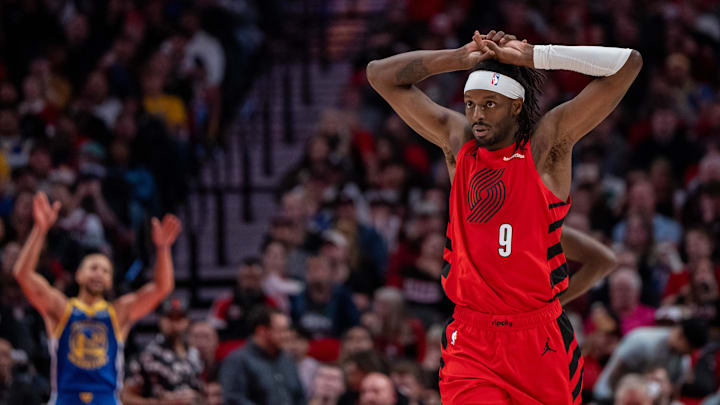The Portland Trail Blazers' Jerami Grant situation continues to get worse. After agreeing to a massive five-year, $160 million contract one day before Damian Lillard's league-altering trade request, it was clear that Grant would no longer align with Portland's rebuilding timeline in their post-Lillard era.
Ideally, he would have gotten traded this past summer. Grant was coming off a productive 2023-24 season in which he averaged 21 points on a career-best 40.2 percent shooting from beyond the arc.
The trade options for other teams were also much more limited compared to the historical deadline that just ensued. Portland should have been eager to get off of him to worsen their record in hopes of landing a better draft pick and clear minutes for up-and-coming players.
But Joe Cronin overvalued Grant, asking for two first-round picks. It would have been considered a steal for the Blazers to offload Grant's contract for just one first-rounder at the deadline, as his play has declined since last season.
This year, Grant is averaging just 14.8 points and shooting 38.5 percent from the field, his worst efficiency since his rookie season. Grant is 30 years old and still on the books until the 2027-28 season, when he has a player option.
The salary cap is expected to increase by roughly ten percent due to the new TV deal. However, even accounting for that, Grant should be considered a negative asset going forward. He will only get worse as he ages, and the Blazers will owe him $36 million in his last season.
It's only going to get harder for the Blazers to move Jerami Grant
It's apparent that it's already difficult to move the $160 million forward since he remains on the roster despite taking away minutes from ascending players like Scoot Henderson and Shaedon Sharpe.
That's only going to get harder from here on out, which isn't ideal, considering that the Blazers' financial flexibility will be much more critical in the coming years when they are finally ready to add pieces to make a playoff push.
Given that the Blazers are only in the second year of their rebuild, they should be emulating other successful rebuilding teams like the Oklahoma City Thunder. We recently referred to GM Sam Presti's success with the Thunder and why he likely wouldn't be taking the Blazers' roster in this direction when critiquing Joe Cronin and the Blazers' inactivity at the deadline.
The point of being a rebuilding team is that you aren't trying to win. Not only to improve your odds of landing someone like Cooper Flagg but also so that you can play the role of a facilitator at the deadline, taking on misfit players to acquire draft capital. The Blazers will have a hard time doing that if Grant remains on the roster long-term.
Judging by Cronin's inability to move him up until this point, it wouldn't be surprising if this is an ongoing issue.
One might say the Blazers don't need to force a trade since they're winning as of late, and Grant is on the books for multiple years. But why did Cronin ever sign Grant to a contract where he'd have to force a trade for Grant in the first place?
